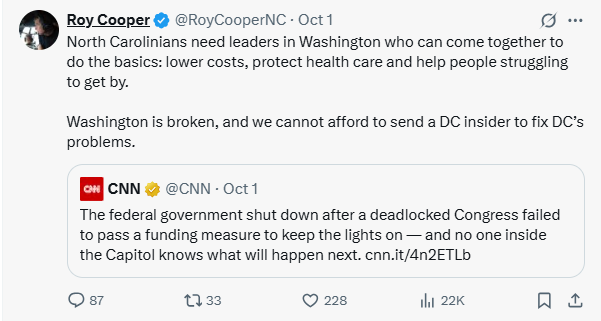Ahead Of Key Vote To End The Government Shutdown, Cooper Refuses To Reveal His Position
Senate Democrats voted against the continuing resolutions, which led to a partial government shutdown that started last Wednesday. The continuing resolution needs 60 votes to clear the filibuster, but only three moderate Democrats have crossed party lines to vote with Republicans, leading to this Democrat government shutdown. While the story has been dominating national news, Senate candidate former Governor Roy Cooper has studiously avoided taking a definitive stance on the simple question of shutting down the government.
Here are Cooper’s two most “definitive” statements on the government shutdown.
Notice that in his statements, Cooper did not clarify whether he would vote yes or no on whether or not to keep the government open. Instead, he simply complained about bickering in Washington, D.C., rather than showing leadership by stating his position on the issue.
The Blue Ridge Times followed up with Cooper’s campaign, asking if Cooper would side with moderate Democrats who voted to keep the government open or if Cooper would side with Chuck Schumer’s decision to shut down the federal government. His team declined to answer.
Cooper’s decision to avoid taking a direct position on the issue reveals the politically dicey situation he’s in. On one hand, the Democrats’ shutdown demand is completely unreasonable and unpopular, but the progressive base is demanding that Democrats fight.
Here are some of the politically toxic demands from national Democrats that Cooper refuses to speak against. Democrats' demands would increase spending by $1.5 trillion, while restoring Biden-era free healthcare for illegal aliens, and eliminating fraud prevention measures for programs like food stamps and Medicaid.
"Roy Cooper knows a government shutdown would jeopardize flood insurance for millions of Americans during hurricane season, leave military families without pay, and put law enforcement lives in jeopardy," said NRSC Regional Press Secretary Nick Puglia. "But Cooper won't say a word against it because he's Chuck Schumer's handpicked Senate candidate who will always put the Democrat Party above what’s best for North Carolina.”
Here are some of the consequences of Schumer’s shutdown that Cooper refuses to stand with moderate Democrats and oppose:
Leave military families without pay.
Put law enforcement lives on the line.
Jeopardize flood insurance for millions of Americans during hurricane season.
Threaten vital healthcare and housing programs for veterans.
Allow funding for Medicare patients’ treatment to expire.
Hurt farmers and ranchers who need certainty to produce our food.
Drive up food prices for America's most needy families.
Tim’s Take: This is yet another example of why North Carolinians can’t count on Cooper. He’s right about one thing— this is precisely what he would do if elected. Cooper would refuse to comment on an issue and vote as party leaders direct him. If Cooper wanted to demonstrate that he would be a moderate, he would say he agrees with Senator Jon Fetterman, who voted to keep the government open. In a classic career politician move, Cooper is complaining about the problem while avoiding taking a position.


